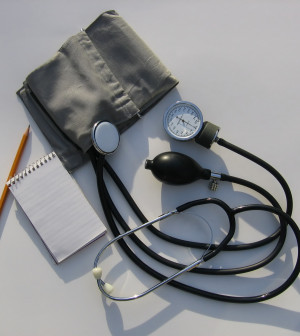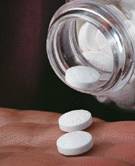- Could Your Grocery Store Meat Be Causing Recurring UTIs?
- Are You Making This Expensive Thermostat Error This Winter?
- Recognizing the Signs of Hypothyroidism
- 10 Strategies to Overcome Insomnia
- Could Artificial Sweeteners Be Aging the Brain Faster?
- Techniques for Soothing Your Nervous System
- Does the Water in Your House Smell Funny? Here’s Why
- Can a Daily Dose of Apple Cider Vinegar Actually Aid Weight Loss?
- 6 Health Beverages That Can Actually Spike Your Blood Sugar
- Treatment Options for Social Anxiety Disorder
Daily Aspirin Fails to Help Heart in Japanese Study


Daily low-dose aspirin therapy may not have significant heart-health benefits for older people, new research suggests.
The study, which involved more than 14,000 Japanese people aged 60 to 85, found no major difference in heart-related deaths or non-fatal heart attacks and strokes between people who took aspirin and those who didn’t.
“It indicates that primary prevention with daily low-dose aspirin does not reduce the combined risk in this population,” said study co-author Dr. Kazuyuki Shimada, of the University of Shin-Oyama City Hospital in Tochigi, Japan.
Despite this study’s findings, people should talk with their doctor before they stop taking aspirin to prevent heart attacks and strokes, said Dr. Michael Gaziano, chief of the division of aging at Brigham and Women’s Hospital in Boston and a professor at Harvard Medical School.
“Patients need to discuss this with their doctor, because I think it’s difficult to do that calculation of benefit and risk without consulting a health care professional,” said Gaziano, who co-authored a commentary accompanying the study published online Nov. 17 in the Journal of the American Medical Association.
Gaziano doesn’t believe the findings will have much of an impact on current U.S. guidelines regarding aspirin. That’s due to limitations of the study, and differences between Japanese and American populations, he said.
Shimada presented the study’s findings on Monday at the American Heart Association annual meeting in Chicago.
In the study, doctors randomly prescribed daily low-dose aspirin to older patients with high blood pressure, high cholesterol or diabetes. They then tracked the patients to see whether they would experience fewer heart attacks or strokes compared with similarly high-risk patients who weren’t taking aspirin.
A monitoring committee stopped the study early because there were too few heart attacks or strokes for the researchers to make statistically significant observations. On average, patients were tracked about 5 years, according to the study.
Shimada noted during his presentation that “the possibility that aspirin does have a beneficial effect cannot be excluded,” given the early end of the trial.
But the findings did show no significant difference in deaths, heart attacks and strokes for people taking aspirin, he said.
Shimada added that there appeared to be a trade-off in risks: people who didn’t take aspirin were at increased risk of “mini-strokes” and chest pain (angina), while people taking aspirin were more likely to experience dangerous bleeding.
In addition, Gaziano noted that there are major differences in heart-related disease between people in Japan and people in the United States.
Japanese people “tend to have fewer heart attacks and more strokes, particularly more hemorrhagic [bleeding] strokes,” Gaziano said. “In this study they had many more strokes than heart attacks, which is not something you’d see in a U.S. population.”
It makes sense for people at high risk of heart problems to take aspirin, he concluded.
“For all those people, they should take aspirin for the long haul, because the benefits outweigh the risk,” Gaziano said. “But if you’re very low risk, the benefits of aspirin likely don’t outweigh the risk” of increased bleeding.
There currently are three large-scale clinical trials with high-risk patients “that will help us find the sweet spot where aspirin can be used for prevention,” he added.
Dr. Dorairaj Prabhakaran, director of the Center for Non-Communicable Diseases at the Public Health Foundation of India, agreed that aspirin remains one of the top preventive measures for heart disease.
“Aspirin is the most inexpensive option and we should pursue its use with vigor in the populations who would most benefit,” he said.
More information
For more about aspirin and heart health, visit the U.S. National Library of Medicine.
Source: HealthDay
Copyright © 2026 HealthDay. All rights reserved.










